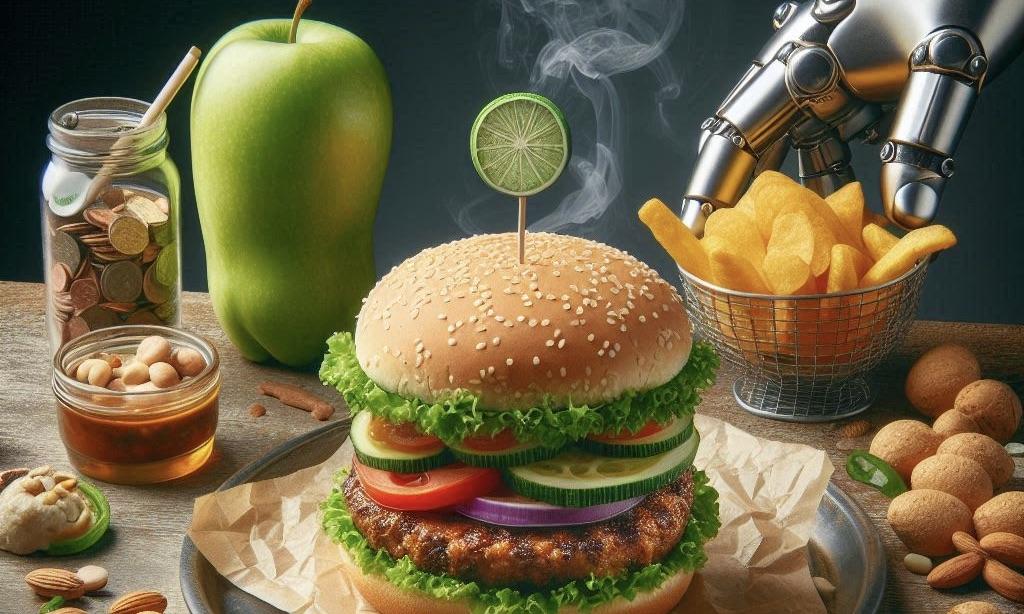In August 2019, Burger King made headlines by introducing the Impossible Whopper across the United States, catering to the growing demand for plant-based dining options. Marketed with the tagline “100% Whopper, 0% beef,” this innovative offering aimed to replicate the taste and experience of a traditional beef burger while utilizing a plant-based patty. The introduction of the Impossible Whopper has since garnered significant attention and popularity, maintaining a steady presence on Burger King’s menu.
The Impossible Whopper mirrors the classic Whopper in almost every way, differing only in the composition of its patty. The vegetarian version contains 630 calories, slightly fewer than the 680 calories found in its beef counterpart. The Impossible Whopper is assembled with the same toppings as the classic version: fresh tomatoes, crisp lettuce, creamy mayonnaise, tangy ketchup, pickles, and sliced white onions, all nestled within a sesame seed bun.
Central to the Impossible Whopper is the plant-based patty, a product of Impossible Foods. This patty is crafted from a blend of soy and potato protein, coconut oil, sunflower oil, and heme. Heme, a molecule found in plants and animals, is pivotal in providing the patty its meat-like flavor and appearance. This combination of ingredients allows the Impossible Whopper to deliver a taste and texture remarkably similar to a traditional beef burger, appealing to vegetarians and meat lovers alike.
Important considerations for vegetarians and vegans when ordering the Impossible Whopper. The standard preparation method for the patty involves cooking on the same broiler used for beef patties, which may not align with strict vegetarian or vegan diets due to potential cross-contamination. However, customers can request that their Impossible Whopper be prepared separately. In such cases, Burger King’s staff will microwave the patty to avoid contact with beef products and omit the mayonnaise to cater to vegan preferences.
This flexibility extends beyond the Impossible Whopper itself. Customers can request the plant-based patty as a substitute for beef in other burgers on the Burger King menu, allowing for a range of vegetarian and vegan-friendly options. This adaptability highlights Burger King’s commitment to accommodating diverse dietary needs and preferences, broadening its appeal in the fast-food market.
The launch and continued success of the Impossible Whopper reflect a broader trend in the food industry towards plant-based alternatives. As more consumers seek sustainable and health-conscious options, the Impossible Whopper represents a significant step in meeting these evolving demands. By offering a plant-based burger that does not compromise on taste, Burger King has successfully tapped into a growing market segment.



 Youth are charting new freshwater futures by learning from the water on the water
Youth are charting new freshwater futures by learning from the water on the water  OpenAI Pentagon AI Contract Adds Safeguards Amid Anthropic Dispute
OpenAI Pentagon AI Contract Adds Safeguards Amid Anthropic Dispute  APEX Tech Acquisition Inc. Raises $111.97 Million in NYSE IPO Under Ticker TRADU
APEX Tech Acquisition Inc. Raises $111.97 Million in NYSE IPO Under Ticker TRADU  Lynas Rare Earths Shares Surge on Strong Half-Year Earnings and Rising Global Demand
Lynas Rare Earths Shares Surge on Strong Half-Year Earnings and Rising Global Demand  Can your cat recognise you by scent? New study shows it’s likely
Can your cat recognise you by scent? New study shows it’s likely  Trump Media Weighs Truth Social Spin-Off Amid $6B Fusion Energy Pivot
Trump Media Weighs Truth Social Spin-Off Amid $6B Fusion Energy Pivot  Columbia Student Mahmoud Khalil Fights Arrest as Deportation Case Moves to New Jersey
Columbia Student Mahmoud Khalil Fights Arrest as Deportation Case Moves to New Jersey  Heritage, desire and diplomacy: why China still values scotch whisky
Heritage, desire and diplomacy: why China still values scotch whisky  BlueScope Steel Shares Drop After Rejecting Revised A$15 Billion Takeover Bid
BlueScope Steel Shares Drop After Rejecting Revised A$15 Billion Takeover Bid  Snowflake Forecasts Strong Fiscal 2027 Revenue Growth as Enterprise AI Demand Surges
Snowflake Forecasts Strong Fiscal 2027 Revenue Growth as Enterprise AI Demand Surges  Meta Signs Multi-Billion Dollar AI Chip Deal With Google to Power Next-Gen AI Models
Meta Signs Multi-Billion Dollar AI Chip Deal With Google to Power Next-Gen AI Models  Locked up then locked out: how NZ’s bank rules make life for ex-prisoners even harder
Locked up then locked out: how NZ’s bank rules make life for ex-prisoners even harder  How to support someone who is grieving: five research-backed strategies
How to support someone who is grieving: five research-backed strategies  FedEx Faces Class Action Lawsuit Over Tariff Refunds After Supreme Court Ruling
FedEx Faces Class Action Lawsuit Over Tariff Refunds After Supreme Court Ruling  AI is driving down the price of knowledge – universities have to rethink what they offer
AI is driving down the price of knowledge – universities have to rethink what they offer 































